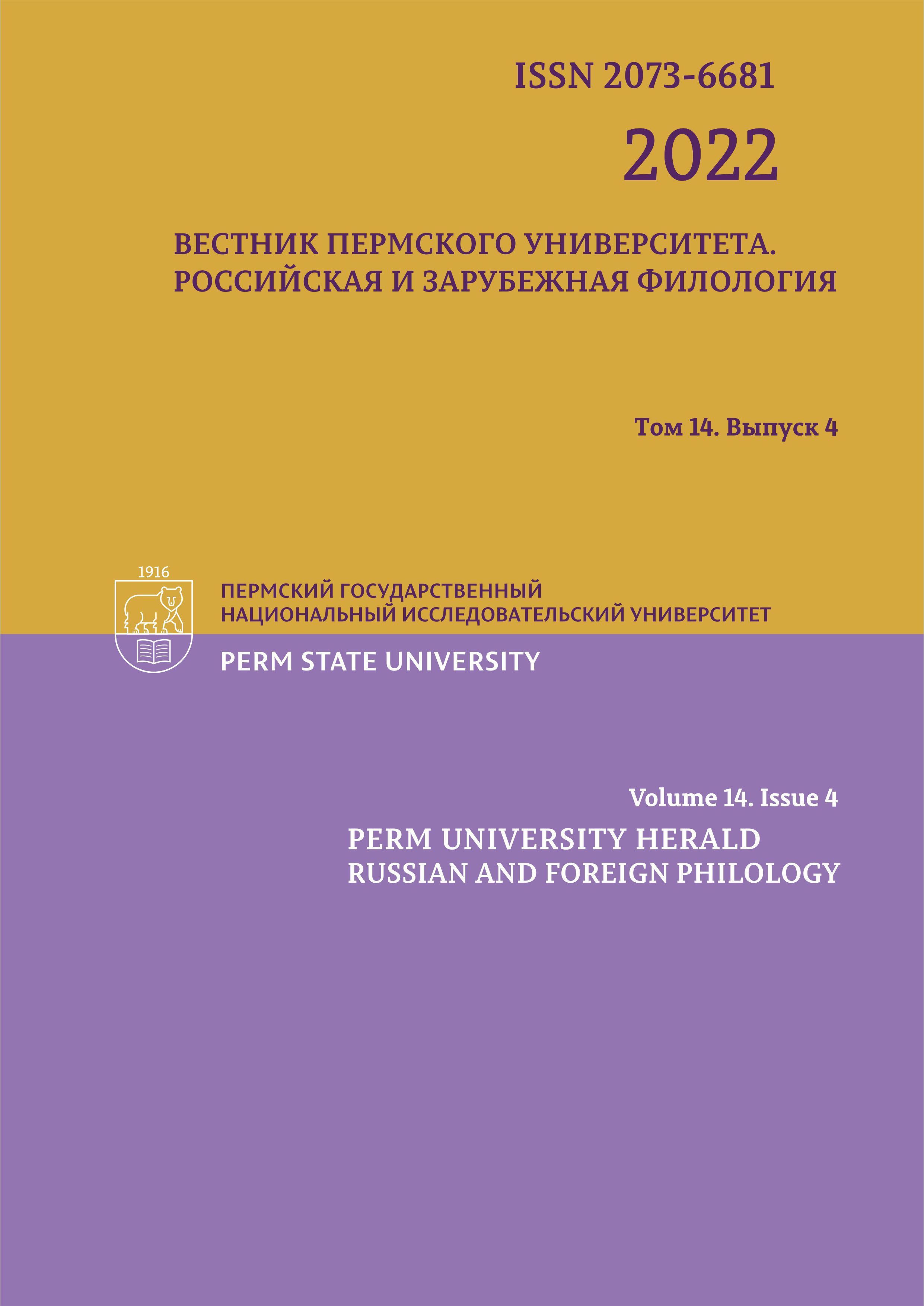On Areal Characteristics of Northern Russian Names of Animals’ Internal Organs
DOI:
https://doi.org/10.17072/2073-6681-2022-4-56-63Keywords:
Russian dialectal vocabulary; dialects of the Russian North; somatic vocabulary; splanchnonyms; semantical and motivational analysis; ethnolinguistics; linguogeography.Abstract
The subject matter of this article is semantical-motivational and linguogeographical peculiarities of Northern Russian splanchnonyms – lexical units naming internal organs (from Greek σπλάγχνα (splánchna), meaning ‘viscera’). The author focuses on the interconnection and overlapping of the names of human viscera and splanchnonyms related to animals. This issue is discussed in the first part of the article. The author notes that splanchnonyms related to humans tend to be secondary in terms of their origin, i.e. to be derivatives of the names of animal viscera. The paper reveals extralinguistic reasons for the language attention of dialect speakers to animal viscera – fishing and hunting, cooking of meat dishes. The second part of the paper includes an overview of splanchnonyms related to animals; overlapping of the relevant cookery and somatic vocabulary is noted; the complexity of the ideographic structure of the vocabulary in question is identified, main ideograms with the words they comprise are listed. The difference between the names of internal organs of livestock and those of fish is shown. Special attention is paid to linguogeographical features of splanchnonyms related to fish: the relevant vocabulary is noted in the zone of contacts with the Finno-Ugric peoples and is characterized by fractional semantic differentiation. In the final part of the article, the author cites particular motivational features characteristic of the words naming animal viscera. The paper also considers metaphorical names, including both splanchnonyms motivated by the names of everyday realities and lexical units related to daily routines that were secondary formed from splanchnonyms. The lexical realization of the motivational transition ‘waste’ – ‘internal organs’ is analyzed.References
Макарова А. А. Русская озерная гидронимия Белозерья: системно-функциональный аспект: дис. … канд. филол. наук. Екатеринбург, 2013. 763 с.
Осипова К. В. К семантико-мотивационной реконструкции севернорусских названий блюд из мяса // Вестник Пермского государственного университета. Российская и зарубежная филология. 2020а. Т. 12, № 3. С. 59–69. doi: 10.17072/
-6681-2020-3-59-69
Осипова К. В. Мясо в рационе севернорусских крестьян: этнолингвистический аспект // Сибирский филологический журнал. 2020б. № 4. С. 308–321. doi 10.17223/18137083/73/21
Персидская А. С. Соматическая лексика селькупского языка: структурно-семантический и лингвокультурологический анализ: дис. … канд. филол. наук. Томск, 2018. 243 с.
Петлева И. П. Этимологические заметки по славянской лексике. VI // Этимология. М.: Наука, 1975. С. 42–51.
Ракин А. Н. Антропотоминимическая лексика в пермских языках: автореф. дис. … д-ра филол. наук. Йошкар-Ола, 1997. 66 с.
Субраков А. Д. Спланхнонимическая лексика современного хакасского языка // Современный ученый. 2019. № 4. С. 266–270.
Толстая С. М. Оппозиция «постный-скоромный» в свете диалектной семантики // Русская диалектная этимология: материалы IV Междунар. науч. конф. Екатеринбург: Изд-во Урал. ун-та, 2002. С. 128–132.
Ушинскене В. Народная анатомическая терминология в русском языке. Словообразовательная и семантическая реконструкция наименований брюшных органов. Вильнюс: Вильнюс. ун-т, 2012. 162 с.
Якушкина Е. И. Диалектные названия скоромной и постной пищи и их вторичные значения // Русская диалектная этимология: материалы IV Междунар. науч. конф. Екатеринбург: Изд-во Урал. ун-та, 2002. С. 132–135.
References
Makarova A. A. Russkaya ozernaya gidronimiya Belozer’ya: sistemno-funktsional’nyy aspekt. Diss. kand. filol. nauk [Russian lacustrine hydronyms of the Belozerye region: System-functional aspect. Cand. philol. sci. diss.]. Yekaterinburg, 2013. 763 p. (In Russ.)
Osipova K. V. K semantiko-motivatsionnoy rekonstruktsii severnorusskikh nazvaniy blyud iz myasa [On semantic and motivational reconstruction of North Russian names of meat dishes]. Vestnik Permskogo gosudarstvennogo universiteta. Rossiiskaya i zarubezhnaya filologiya [Perm University Herald. Russian and Foreign Philology], 2020a, vol. 12, issue 3, pp. 59–69. doi 10.17072/2073-6681-2020-3-59-69. (In Russ.)
Osipova K. V. Myaso v ratsione severnorusskikh krest’yan: etnolingvisticheskiy aspekt [Meat in the diet of North Russian peasants: Ethnolinguistic aspect]. Sibirskiy filologicheskiy zhurnal [Siberian Journal of Philology], 2020b, issue 4, pp. 308–321. doi 10.17223/18137083/73/21. (In Russ.)
Persidskaya A. S. Somaticheskaya leksika sel’kupskogo yazyka: strukturno-semanticheskiy i lingvokul’turologicheskiy analiz. Diss. kand. filol. nauk [Somatic lexis of the Selkup language: Structural-semantic and linguoculturological analysis. Cand. philol. sci. diss.]. Tomsk, 2018. 243 p. (In Russ.)
Petleva I. P. Etimologicheskie zametki po slavyanskoy leksike. VI [Etymological notes on Slavic lexis. VI]. Etimologiya [Etymology]. Moscow, Nauka Publ, 1975, pp. 42–51. (In Russ.)
Rakin A. N. Antropotominimicheskaya leksika v permskikh yazykakh. Avtoreferat diss. d-ra filol. nauk [Anthropotominimic lexis in the Permian languages. Abstract of Dr. philol. sci. diss.]. Yoshkar-Ola, 1997. 66 p. (In Russ.)
Subrakov A. D. Splankhnonimicheskaya leksika sovremennogo khakasskogo yazyka [Splankhnonimichesky lexicon of modern Khakass language]. Sovremennyy uchenyy [Modern Scientist], 2019, issue 4, pp. 266–270. (In Russ.)
Tolstaya S. M. Oppozitsiya ‘postnyy-skoromnyyʼ v svete dialektnoy semantiki [The opposition ‘lenten – non-lentenʼ from the perspective of dialectal semantics]. Russkaya dialektnaya etimologiya: Materialy IV Mezhdunarodnoy nauchnoy konferentsii [Russian Dialectal Etymology: Proceedings of the 4th International Scientific Conference]. Yekaterinburg, Ural Federal University Press, 2002, pp. 128–132. (In Russ.)
Ushinskene V. Narodnaya anatomicheskaya terminologiya v russkom yazyke. Slovoobrazovatel’naya i semanticheskaya rekonstruktsiya naimenovaniy bryushnykh organov [The Folk Anatomical Nomenclature in the Russian Language: Word-Formation and Semantic Reconstruction of Names of Abdominal Organs]. Vilnius, Vilnius University Press, 2012. 162 p. (In Russ.)
Yakushkina E. I. Dialektnye nazvaniya skoromnoy i postnoy pishchi i ikh vtorichnye znacheniya [Dialectal names of non-lenten and lenten food and their secondary meanings]. Russkaya dialektnaya etimologiya: Materialy IV Mezhdunarodnoy nauchnoy konferentsii [Russian Dialectal Etymology: Proceedings of the 4th International Scientific Conference]. Yekaterinburg, Ural Federal University Press, 2002, pp. 132–135. (In Russ.)




